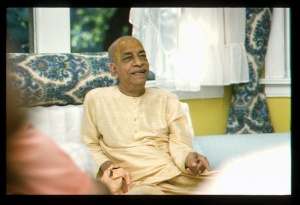CC Adi 7.153: Difference between revisions
m (1 revision(s)) |
No edit summary |
||
| Line 1: | Line 1: | ||
{{ | [[Category:Sri Caitanya-caritamrta - Adi-lila Chapter 07|C153]] | ||
<div style="float:left">'''[[Sri Caitanya-caritamrta|Śrī Caitanya-caritāmṛta]] - [[CC Adi|Ādi-līlā]] - [[CC Adi 7|Chapter 7: Lord Caitanya in Five Features]]'''</div> | |||
<div style="float:right">[[File:Go-previous.png|link=CC Adi 7.152|Ādi-līlā 7.152]] '''[[CC Adi 7.152|Ādi-līlā 7.152]] - [[CC Adi 7.154|Ādi-līlā 7.154]]''' [[File:Go-next.png|link=CC Adi 7.154|Ādi-līlā 7.154]]</div> | |||
{{CompareVersions|CC|Adi 7.153|CC 1975|CC 1996}} | |||
{{RandomImage}} | |||
==== TEXT 153 ==== | ==== TEXT 153 ==== | ||
<div | <div class="verse"> | ||
candraśekhara, tapana miśra, āra sanātana | :candraśekhara, tapana miśra, āra sanātana | ||
śuni’ dekhi’ ānandita sabākāra mana | :śuni’ dekhi’ ānandita sabākāra mana | ||
</div> | </div> | ||
| Line 12: | Line 16: | ||
==== SYNONYMS ==== | ==== SYNONYMS ==== | ||
<div | <div class="synonyms"> | ||
''candraśekhara''—Candraśekhara; ''tapana miśra''—Tapana Miśra; ''āra''—and; ''sanātana''—Sanātana; ''śuni’''—hearing; ''dekhi’''—seeing; ''ānandita''—very pleased; ''sabākāra''—all of them; ''mana''—minds. | |||
</div> | </div> | ||
| Line 19: | Line 23: | ||
==== TRANSLATION ==== | ==== TRANSLATION ==== | ||
<div | <div class="translation"> | ||
Hearing the arguments of Śrī Caitanya Mahāprabhu and seeing His victory, Candraśekhara, Tapana Miśra and Sanātana Gosvāmī were all extremely pleased. | Hearing the arguments of Śrī Caitanya Mahāprabhu and seeing His victory, Candraśekhara, Tapana Miśra and Sanātana Gosvāmī were all extremely pleased. | ||
</div> | </div> | ||
| Line 26: | Line 30: | ||
==== PURPORT ==== | ==== PURPORT ==== | ||
<div | <div class="purport"> | ||
Here is an example of how a sannyāsī should preach. When Śrī Caitanya Mahāprabhu went to Vārāṇasī, He went there alone, not with a big party. Locally, however, He made friendships with Candraśekhara and Tapana Miśra, and Sanātana Gosvāmī also came to see Him. Therefore, although He did not have many friends there, due to His sound preaching and His victory in arguing with the local sannyāsīs on the Vedānta philosophy, He became greatly famous in that part of the country, as explained in the next verse. | Here is an example of how a ''sannyāsī'' should preach. When Śrī Caitanya Mahāprabhu went to Vārāṇasī, He went there alone, not with a big party. Locally, however, He made friendships with Candraśekhara and Tapana Miśra, and Sanātana Gosvāmī also came to see Him. Therefore, although He did not have many friends there, due to His sound preaching and His victory in arguing with the local ''sannyāsīs'' on the Vedānta philosophy, He became greatly famous in that part of the country, as explained in the next verse. | ||
</div> | </div> | ||
__NOTOC__ | |||
<div style="float:right; clear:both;">[[File:Go-previous.png|link=CC Adi 7.152|Ādi-līlā 7.152]] '''[[CC Adi 7.152|Ādi-līlā 7.152]] - [[CC Adi 7.154|Ādi-līlā 7.154]]''' [[File:Go-next.png|link=CC Adi 7.154|Ādi-līlā 7.154]]</div> | |||
__NOTOC__ | |||
__NOEDITSECTION__ | |||
Revision as of 10:16, 13 July 2021

A.C. Bhaktivedanta Swami Prabhupada
TEXT 153
- candraśekhara, tapana miśra, āra sanātana
- śuni’ dekhi’ ānandita sabākāra mana
SYNONYMS
candraśekhara—Candraśekhara; tapana miśra—Tapana Miśra; āra—and; sanātana—Sanātana; śuni’—hearing; dekhi’—seeing; ānandita—very pleased; sabākāra—all of them; mana—minds.
TRANSLATION
Hearing the arguments of Śrī Caitanya Mahāprabhu and seeing His victory, Candraśekhara, Tapana Miśra and Sanātana Gosvāmī were all extremely pleased.
PURPORT
Here is an example of how a sannyāsī should preach. When Śrī Caitanya Mahāprabhu went to Vārāṇasī, He went there alone, not with a big party. Locally, however, He made friendships with Candraśekhara and Tapana Miśra, and Sanātana Gosvāmī also came to see Him. Therefore, although He did not have many friends there, due to His sound preaching and His victory in arguing with the local sannyāsīs on the Vedānta philosophy, He became greatly famous in that part of the country, as explained in the next verse.